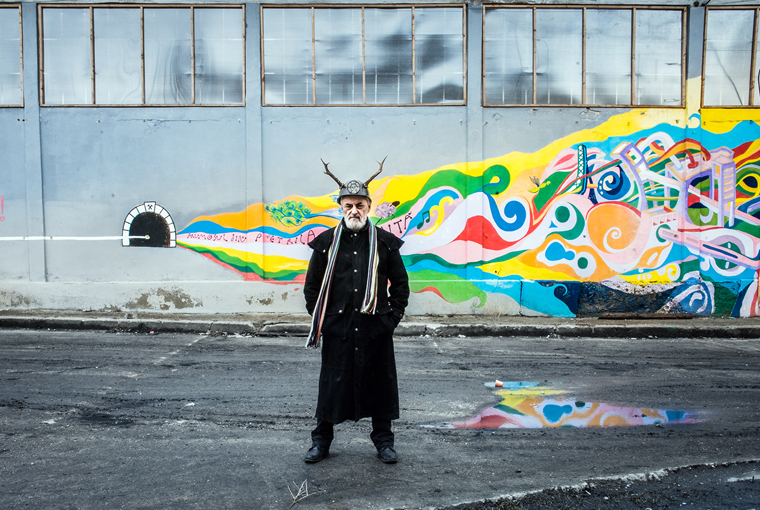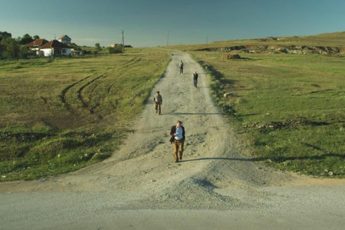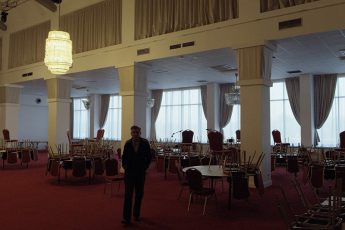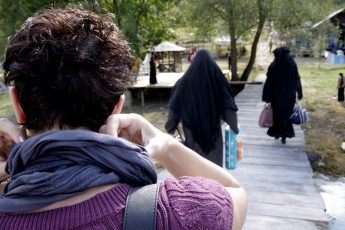Ceci n’est pas un mine- Making Absurdism Great Again
Andrei Dăscălescu’s Planet Petrila (Planeta Petrila, 2017)
Vol. 76 (Summer 2017) by Zoe Aiano
On the basis of its synopsis, Planet Petrila could easily come across as offputtingly niche or worthy. Following events in a Romanian mining town, it simply and unpretentiously charts the struggles of the local inhabitants as they attempt to save the industrial buildings from destruction. Indeed, there is almost no way to describe it that does justice to the film’s charm and far-reaching resonance. As is often the struggle with good documentary, and good cinema in general, some of the most universal stories come from the most esoteric, particular sources, but how then to persuade audiences to watch them?
The film’s most obvious asset is its protagonist, Ion Barbu, an anarchic soul with seemingly boundless creativity and true mastery of surrealism as a weapon. A former mine employee turned artist, he views culture as the only hope for his city’s future. He aspires to establish his own gallery in Petrila, and fights to salvage one of the mine buildings for that end. Mockingly and lovingly referencing high art and pop culture alike, his imaginative interventions provoke the authorities with their brash color and humor. In addition, they also bring together an impressively diverse range of participants, from young hipsters to conservative pensioners, demonstrating not only the persuasive power of his approach but also the added value of these events for establishing a sense of community. Often anachronistically accompanied by an entire brass band, his actions range from absurdist fashion parades, where people dressed as historical figures protest living conditions, to literally painting the town. Under his initiative, the old pump station becomes the “Pumpidou”, while a cylindrical building gets rebranded as a Warhol-style can bearing the slogan “Conserva” (a pun on the noun for “tinned food” and the imperative for “preserve”).
While Barbu’s exuberance and vivacity could easily end up oversaturating the film and exhausting audiences, this problem has been skillfully circumvented by the inclusion of a calm but equally likeable counterpart. Cătălin Cenuşă is the heartbreakingly sad-eyed but quietly authoritative leader of the last remaining unit of miners working underground. The men have stoically accepted the inevitability of their unemployment, but reject the idea that no trace will be left of the industry that led to the formation of the city in the first place. The scenes of the miners at work provide a moving glimpse into a moribund form of labor that has seen generations subjected to horrendous working conditions, but which also has provided the basis of the local community. Reflecting this, these vignettes reveal the intense sense of intimacy, trust and fraternity between them, even if this largely manifests itself through jokes in questionable taste. Importantly for the structure of the narrative arch, it also provides a necessary break from Barbu’s antics. Together, the two offer an impressive challenge to any preconceptions of what a miner should be, the one intellectual and voraciously progressive, the other gentle and humane.
Director Andrei Dăscălescu often adopts a playful, creative and appropriately colorful aesthetic, using techniques such as time lapses and staged moments. The subtitling of Barbu’s ubiquitous slogans follows the camera movement in the center of screen, while the soundtrack plays on different genres, with moments of live performance and modern interpretations of traditional mining ballads. As an added bonus, lovers of Brutalism can also enjoy some short but sweet moments of architecture porn. Interestingly, in taking this populist approach, Planet Petrila goes against a significant wave of recent documentaries about mines that privilege metaphor and formalist poetics over character and story. Whatever prestige it may lose within the art-house bubble from this choice, it nevertheless convinces as the most appropriate for the film and its characters, with the tone perfectly pitched between comedic, angry and empathetic.
As a continuation of this, it is also one of the few films to go beyond simply critiquing the actions of local government and the mechanisms of late capitalism to pose the question of what can plausibly come after industry. Culture in and of itself may well prove too ephemeral to be the salvation of places like Petrila, but at least action is being taken in a positive direction. Moreover, Romania has set a stark precedent in the use of mass protests in recent years, which adds another layer of interest and poignancy to the example of Petrila. However, its message remains applicable to practically every context in this era of endemic inequality and political disenfranchisement – when combined, creativity and passion are enough to mobilize people and effect change. It may be a slightly cheesy message, but it’s probably the message we all need to hear at this point, and in this instance, it comes from an exceptionally persuasive spokesperson.




Leave a Comment